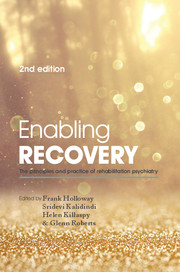Book contents
- Frontmatter
- Contents
- List of contributors
- List of figures, tables and boxes
- Preface
- Part 1 Setting the scene
- 1 Rehabilitation in a historical context
- 2 What is psychiatric rehabilitation?
- 3 Rehabilitation as a values-led practice: the contribution of recovery, social inclusion and personalisation
- 4 A comprehensive approach to assessment in rehabilitation settings
- 5 Understanding madness: a psychosocial perspective
- 6 First-person narratives
- Part 2 Treatment approaches
- Part 3 Key elements of a rehabilitation service
- Part 4 Special topics in psychiatric rehabilitation
- Part 5 Future directions
- Index
6 - First-person narratives
from Part 1 - Setting the scene
Published online by Cambridge University Press: 02 January 2018
- Frontmatter
- Contents
- List of contributors
- List of figures, tables and boxes
- Preface
- Part 1 Setting the scene
- 1 Rehabilitation in a historical context
- 2 What is psychiatric rehabilitation?
- 3 Rehabilitation as a values-led practice: the contribution of recovery, social inclusion and personalisation
- 4 A comprehensive approach to assessment in rehabilitation settings
- 5 Understanding madness: a psychosocial perspective
- 6 First-person narratives
- Part 2 Treatment approaches
- Part 3 Key elements of a rehabilitation service
- Part 4 Special topics in psychiatric rehabilitation
- Part 5 Future directions
- Index
Summary
Introduction
One of the most significant developments in contemporary psychiatry has been the emergence of a burgeoning literature of inspiring first-person narratives (Carson, 2013a). These may be defined as ‘a relatively brief report, usually focussed on one or a few aspects of lived experience of a person, who has one or more mental health challenges, or less commonly, a significant other of such a person’ (Rudnick et al, 2011: p. 879). This upsurge has been partly stimulated by the recovery approach, described ‘as a grassroots movement of the disenfranchised’ (Resnick & Rosenheck, 2006: p. 121). In this chapter, I start off by outlining the importance of firstperson narratives and outline my involvement in co-developing some of the first-person narrative base. Four examples are then presented, two written by mental health professionals who have also experienced mental health problems and two written by others with lived experience. The findings of two comprehensive reviews of the first-person narrative literature will be discussed, and a critique presented of the use by services of first-person literature, before I conclude by underlining the importance and value of this literature. I should state at the outset that this account is written by a professional, not from the perspective of someone with lived experience, which may of course limit the power of my own narrative account.
Broadly speaking, first-person narrative accounts can be broken into two categories. First, there are accounts written by mental health professionals, who have themselves experienced mental illnesses, such as the book Wounded Healers, edited by Vicki Rippere and Ruth Williams (Rippere & Williams, 1985). Second, there are personal or edited accounts about individuals with lived experience (Styron, 1990; Kaysen, 1993; LeCroy & Holschuh, 2012; Nizette et al, 2013). Hornstein (2011) lists over 700 titles. Several psychiatric journals publish first-person accounts, including Psychiatric Services, Psychosis, the Psychiatric Rehabilitation Journal and the Schizophrenia Bulletin. The last has been publishing such accounts (133 at the time of writing) since 1979. The first paper (DuVal, 1979) described a mother's worry that her child might grow up to develop schizophrenia and the steps she took to improve her parenting and his upbringing as she recovered.
- Type
- Chapter
- Information
- Enabling Recovery , pp. 99 - 110Publisher: Royal College of PsychiatristsPrint publication year: 2015

